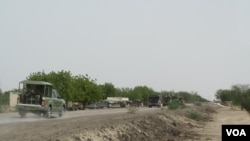Nigeria’s Northern Elders Forum (NEF) has condemned an attack in Yobe state in which suspected Islamist gunmen killed at least 30 people at a boarding school over the weekend.
A prominent member of the Elders Forum, Ango Abdullahi, said the group will meet this week to develop plans to assist the Yobe state’s administration following the massacre.
“We are urging very strongly that in this kind of situation all means possible should be pursued to end this [security] crisis,” said Abdullahi.
Yobe state’s governor, Ibrahim Geidam, ordered all schools in his jurisdiction closed down until September while authorities set up new procedures to better protect students and teachers. Some officials blame radical Islamic sect, Boko Haram, for the massacre.
The U.N. Children's Fund, UNICEF, says a total of 48 students and seven teachers have been killed in northeastern Nigeria since June 16.
Some Nigerians have expressed concern that military efforts to end the violence have not been successful.
Yobe state is one of the Northern states in which President Goodluck Jonathan declared a state of emergency and sent in troops in an attempt to put down militants fighting to create a breakaway Islamic state.
Abdullahi also denied allegations that the Northern Elders Forum had not been helpful in seeking solutions to the security crisis in the country.
“I don’t know what else we can do apart from giving advice and giving suggestions and recommendations in terms of how to end this crisis,” said Abdullahi. “We played a major role in bringing about the dialogue and reconciliation committee.”
Abdullahi also said the Elders Forum had called for dialogue between the Nigerian government and representatives from Islamist groups as part of a reconciliation effort to address the security crisis.
“The lesson of dialogue should really be pursued as vigorously as we can so that perhaps we can begin to see some light at the end of the tunnel,” said Abdullahi. “I heard some faction of the insurgency is [reportedly] willing to go into ceasefire unconditionally.
“To me, if this is true,” he continued, “the dialogue and contact [can] perhaps yield fruits more than the sheer force that we have employed, and despite the sheer force did not stop the killings.”
A prominent member of the Elders Forum, Ango Abdullahi, said the group will meet this week to develop plans to assist the Yobe state’s administration following the massacre.
“We are urging very strongly that in this kind of situation all means possible should be pursued to end this [security] crisis,” said Abdullahi.
Yobe state’s governor, Ibrahim Geidam, ordered all schools in his jurisdiction closed down until September while authorities set up new procedures to better protect students and teachers. Some officials blame radical Islamic sect, Boko Haram, for the massacre.
The U.N. Children's Fund, UNICEF, says a total of 48 students and seven teachers have been killed in northeastern Nigeria since June 16.
Some Nigerians have expressed concern that military efforts to end the violence have not been successful.
Yobe state is one of the Northern states in which President Goodluck Jonathan declared a state of emergency and sent in troops in an attempt to put down militants fighting to create a breakaway Islamic state.
Abdullahi also denied allegations that the Northern Elders Forum had not been helpful in seeking solutions to the security crisis in the country.
“I don’t know what else we can do apart from giving advice and giving suggestions and recommendations in terms of how to end this crisis,” said Abdullahi. “We played a major role in bringing about the dialogue and reconciliation committee.”
Abdullahi also said the Elders Forum had called for dialogue between the Nigerian government and representatives from Islamist groups as part of a reconciliation effort to address the security crisis.
“The lesson of dialogue should really be pursued as vigorously as we can so that perhaps we can begin to see some light at the end of the tunnel,” said Abdullahi. “I heard some faction of the insurgency is [reportedly] willing to go into ceasefire unconditionally.
“To me, if this is true,” he continued, “the dialogue and contact [can] perhaps yield fruits more than the sheer force that we have employed, and despite the sheer force did not stop the killings.”





